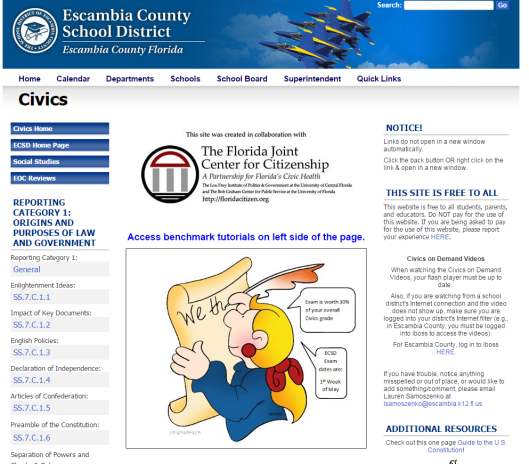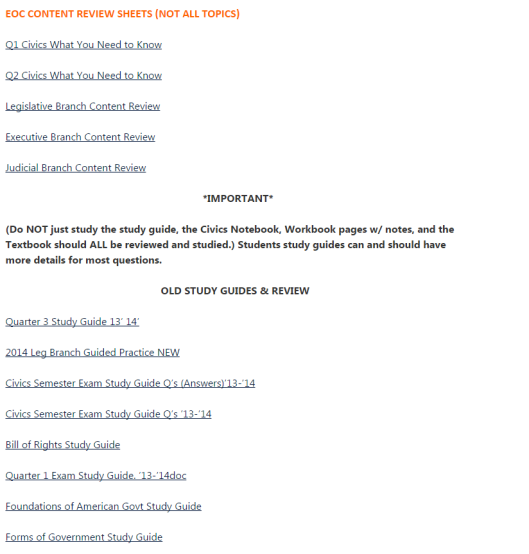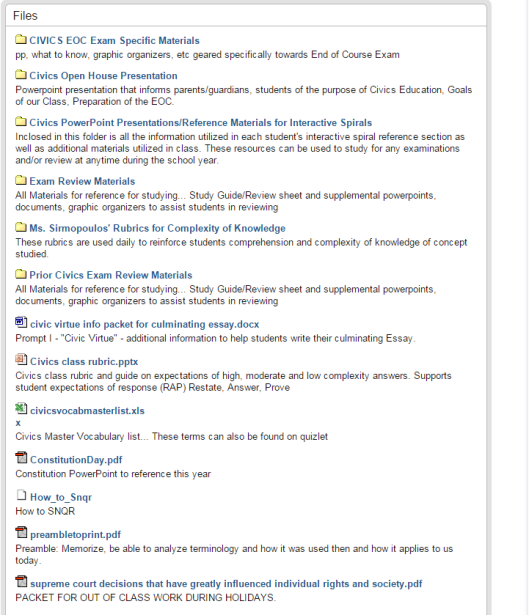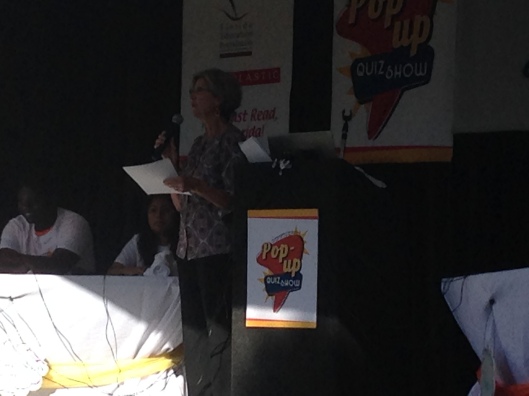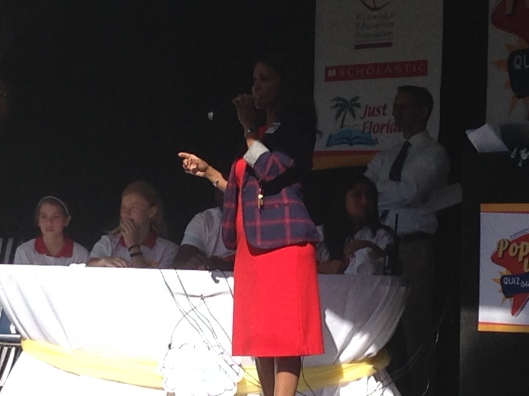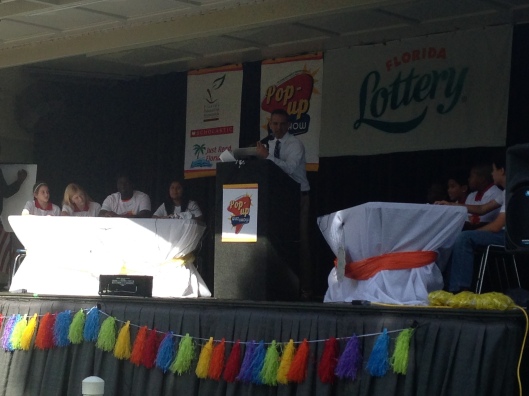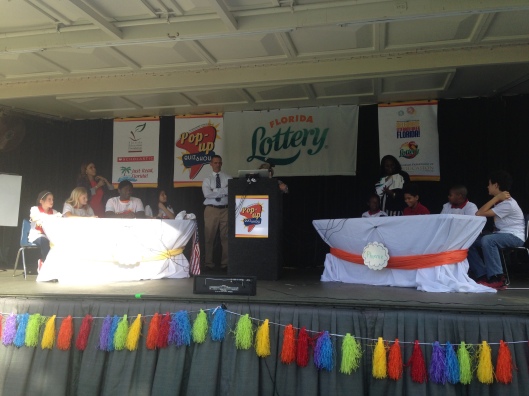In this height of the election season, we are all looking for ways in which we can approach instruction concerning the sometimes confusing primary and caucus process. Recognizing this, our own Dr. Terri Fine has crafted a 4 day lesson plan that provides students an opportunity to engage students in an exploration of those elements of an election. And if any election begged for help in understanding it, it is this one for sure! The lesson plan is aligned with the Florida high school civics benchmarks: SS.912.C.2.14 Evaluate the processes and results of an election at the state or federal level, and SS.912.C.2.2 Evaluate the importance of political participation and civic participation. That does not mean, however, that you couldn’t use this to teach it in other grade levels or states! You can find the lesson plan on our website, and we are, as always very interested in feedback!
Category Archives: General Civic Education
Florida Middle School Civics EOCA Review Resources
The Middle School Civics EOCA is just around the corner, and we have been asked about resources that might be useful in reviewing for the exam. So without further ado, here are some possibilities that could serve you well! I have personally reviewed each of these resources, and am comfortable recommending them to you. And if you have any additions to this compilation, please feel free to share! Click on the link in the heading or in the text to access the resource.
FLDOE 2015 Civics Content Focus Reports
The 2015 Civics Content Focus Reports give you at least some idea of what the test might look like. Be sure to note the cautions on page 9. You will also want to review the Civics EOC Test Item Specifications, which you hopefully have been using throughout the year!
Florida Students Civics Tutorials

We have written about these tutorials before, and they are the first resource I recommend for both instruction and review. They are excellent for a flipped classroom model as well. If you are planning on using them as a review resource, I recommend assigning students only the parts of the tutorials they need, and it would be more effective to perhaps set these up in learning stations across the classroom. You could require that students screen-capture or write down responses to the assessment elements in order to ensure completion and comprehension.
Escambia County Civics EOC Review Site
The Escambia site is one that we helped develop, so we do have some attachment to it, but we also believe that the Student Friendly Readings for each benchmark clarification, as well as the assessment items (with answers) and Quizlet vocabulary review tool can serve you well in a review effort. Students can use each of the one page readings to refresh key content that they need, and it lends itself well to a learning center or small group model of review.
Florida Virtual School Resources
 The recorded review sessions, available for free at the bottom of the FLVS page, do a good job covering elements of each of the four reporting categories that will be assessed on the EOC. Because they are about 2 hours long, you will want to preview each one and determine where you might want students to focus their attention. They may also provide you with a model for your own approach to classroom-based reviews. I especially appreciate how an effort is made to integrate assessment elements. Please be aware that you will need to download Blackboard Collaborate to run the videos.
The recorded review sessions, available for free at the bottom of the FLVS page, do a good job covering elements of each of the four reporting categories that will be assessed on the EOC. Because they are about 2 hours long, you will want to preview each one and determine where you might want students to focus their attention. They may also provide you with a model for your own approach to classroom-based reviews. I especially appreciate how an effort is made to integrate assessment elements. Please be aware that you will need to download Blackboard Collaborate to run the videos.
You will also want to check out the FLVS Civics EOC Practice test, which may be of use to you. Again, however, this shouldn’t be the first time that students are being exposed to these types and styles of items. Answers to the practice test items are available here. Note that answers are actually explained as well, which is an excellent element of review. I would suggest actually having students explain WRONG answers. If they can tell you why an answer is wrong, they should have a much easier time of figuring out why an answer might be right!
We wrote about this review model last year, and it may be one that you find useful as well. It worked well for Randall Middle School, and it is a positive way to mix things up a little for both you and your students. We explored this model in great detail in this post, and I encourage you to take a look and see if it is something you might like to do.
District Review Sheets and Practice Tests
Many districts have done a good job developing practice tests and review sheets for the EOC. Based on what I have had a chance to see, I can recommend a couple at the least.
Marion County, which has fantastic leadership in the social studies department, has provided teachers and students with an EOC study guide, made up of a mix of short answer questions, EOC style questions, and vocabulary, all of which draw on the test item specifications. All or part of this is something that I encourage you to adapt and adopt for your own review. Even having the students collaborate on the completion of the study guide could be a huge help for them in preparing for the EOC. Note that the guide is developed in conjunction with their own particular pacing guide and text; you can adapt the chapter and unit headings where necessary.
Pasco County has provided a quality practice test as well, though I prefer the FLVS version because of the answer explanations. Still, it is another way to measure student understanding and get a sense of areas of need while also ensuring ongoing exposure to EOC type questions.
TEACHER WEBSITES
Mr. Kula, social studies teacher at Westpine Middle School in Broward County, has compiled a number of quality content rich and illustrated study guides for the Civics EOC that could be useful for you. While they don’t cover every benchmark, what IS there is effective, and broken down by topic. These would be appropriate for students to use in conjunction with a written review or in small groups using an ‘expert group’ teaching model.
Mrs. Hirsch, a teacher at Fruit Cove Middle School in St. John’s County, has gathered a number of excellent tools for EOC review. The EOC Content Review sheets that she has provided are well done and engaging, and definitely worth sharing with your own students:
Q1 Civics What You Need to Know
Q2 Civics What You Need to Know
Legislative Branch Content Review
Executive Branch Content Review
Judicial Branch Content Review
Civics Assessment Strategy Guide
Here is an EXCELLENT and short powerpoint covering strategies for the EOC. I cannot recommend it enough!
Ruckel Middle School Civics Flashcards
Ruckel Middle School, in Okaloosa County, has developed a tool using Quizlet that provides students with flashcards for review. These might be useful as a bellringer or exit slip activity as you wrap up content this year and start to transition to in depth review.
Ms. Sirmopoulos’ Civics Review Materials
Jackie Sirmopoulos, an excellent and wonderfully effective teacher at PK Yonge Lab School in Gainesville, has been teaching Civics, with some of the highest scores in the state, for awhile. She has provided a plethora of useful review materials that I encourage you to explore. I have looked at almost all of them in each folder, and are all well aligned to the benchmarks and useful in helping you start to address possible student deficiencies while ensuring understanding among all of your students.
These are just a few of the quality review resources that you might find beneficial. If you have any additional resources to share, please shoot me an email or leave it in the comments!
A Quick Look at Three Ways to Approach Picture Analysis
As educators, we are always looking for new ways to approach our content and engage our students. A few weeks ago, the FJCC had the pleasure of providing professional development to teachers in Highlands County, a small rural county here in Florida very similar to where your humble blog host spent much of his early career. While there, I had the chance to speak with Holly Ard. Holly basically functions as the social studies specialist in the district while still teaching her own classes, and does excellent work.
One of the most difficult tasks for students to do, particularly at the lower grades, is to interpret primary sources, especially visual sources. While we stress the importance of primary sources, we often fail to actually provide teachers or students with the tools necessary to use them! This, in a time when disciplinary literacy has re-emerged as an important element of social studies teacher education thanks in part to the C3 Framework. Holly has attempted to address this issue by integrating a Picture Analysis Strategy. The strategy she uses is aimed at students of differing ability levels, and in talking with her, it seems to work well in engaging students with somewhat difficult content!
Working with partners, students individually break down the image, using the guide below. Note that the four ‘boxes’ represent the four quadrants of the image, a popular approach for image analysis. Having students create a title for the image does a nice job getting to the Common Core/Florida Standards expectation that students should be able to summarize text of all kinds. What else is a good a title than a really short and really strong summary of text?
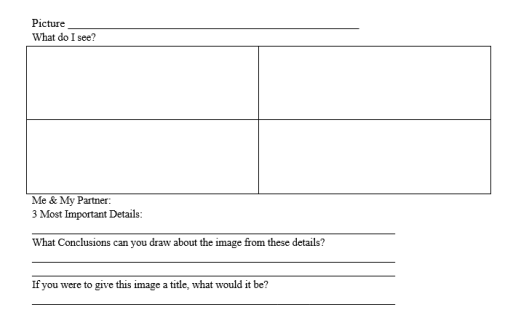
Another way to approach image analysis is seen below. This version of the analysis template can be done with a partner or individually. I appreciate how it seeks to have students connect it directly to what they are learning. Relations between content and context is important.
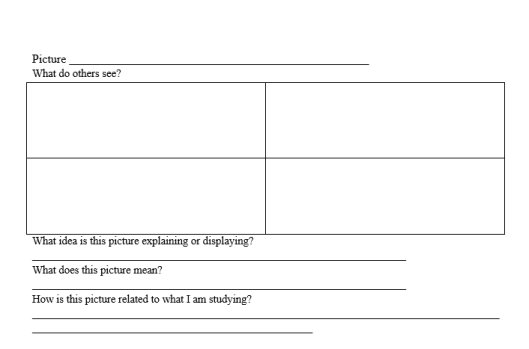
I especially love this version of the picture analysis activity, which may be most useful for paintings or photographs of a perhaps persuasive bent.
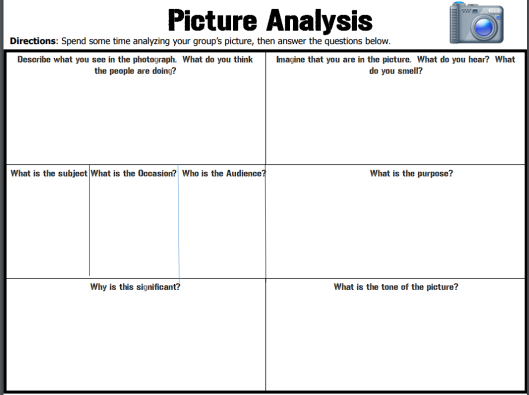
Thanks, Holly, for sharing these approaches. We look forward to more goodness from you!
By the way, if you are looking for resources in Civics or History that can help kids with primary sources, I encourage you to check out the Stanford History Education Group!
New Goals for Florida Citizen!
So, we recently had a Lou Frey Institute/Florida Joint Center for Citizenship staff meeting here at our office. It was two days of planning for the future, led by our inestimable director, Dr. Doug Dobson, and it was refreshing to sit down with the entire Lou Frey Institute/FJCC staff to discuss issues and direction for the work that we do. I just wanted to take a moment and share with you, our friends in civic education here in Florida and nationally, just some what we have going on and where we are going organizationally. This is not an inclusive list; this is just what we are most excited about!
Projects with National Archives
We have have developed, over the past few years, an ongoing relationship with the fine folks at the National Archives. They have been kind enough to share personnel who were more than willing to come to Florida to work with our teachers on using primary sources. Happily, they will be working with us next month to develop bellringer/formative assessment or enrichment type resources that are aligned with high school US History and US Government benchmarks. This is new ground for us, as most of our focus has been on the middle school and (to a lesser degree) elementary school level. We are also hoping, sometime this summer, to work with the National Archives to develop additional elementary school resources centered around primary sources.
Adopting the SAMR Model
One of the biggest issues we face with our curriculum is that while we believe that we have quality resources, they follow a traditional model of classroom pedagogy. To address this, we are exploring ways in which we can adopt the SAMR model in our curricular revision and design.

The SAMR Model of Educational Technology . Check out more at http://edtechvoice.com/lesson-1/the-samr-model/
We are definitely open to suggestions on this end, for sure. Right now, I will be meeting with the Educational Technology experts over at the UCF College of Education to explore possibilities. At the same time, we are striving to find a way to make our curricular materials more ESE and ESOL friendly. We have high hopes that we will bring you new and improved resources!
Website Redesign (Again!)
One of the most pressing needs across the state is for our teachers to be able to disseminate some of the great resources they themselves have created. We are working on a way to facilitate that. We hope to add an expansion to Florida Citizen that allows users to upload materials and share them with others. It will feature a ‘vetting’ system that will allow FJCC to recommend some of these materials as well. We have lots of hopes, and I expect that our great IT leader, Mike Barnhardt, will do some good things.
Civics Teaching Certificate
The Civics Teaching Certificate will provide pre-service teachers with complementary, civics teaching-focused coursework that will build on and enhance the Social Science Education B.S. curriculum. Individuals enrolled in the Civics Teaching certificate program will learn the substantive content, skills and pedagogical tools needed to deliver instruction explicitly linked to the 7th grade Civics End of Course Assessment (EOCA) in Florida. The Civics Teaching Certificate will also support and enhance high school U.S. government instruction. Reflecting the importance of service and experiential learning in civic education, enrollees will also take part in a summer internship that involves them in hands-on practice with local government.
Pre-service teachers enrolled in the Social Science Education B.S. major will complete four courses to develop expertise in civics content, pedagogy and assessment. The Civics Teaching Certificate will be completed as a three semester sequence. Summer coursework will include an internship in a local government office.
On the Drawing Board
We have a number of goals for the coming months. We would like to bring back some semblance of the Civic Mentor Teacher Program. We are working on a prototype, developed in house, of a three to five minute student oriented video on specific civics content, most likely around the election. This will, we believe, provide us an opportunity to see what we can affordably do with our own resources. If the video is received positively, we would love to develop more to supplement the already good teacher-oriented videos on the Florida Citizen site. We are also going to be starting work in Duval County with a couple of schools in need of assistance in Civics, and we are excited for this opportunity! Finally, we will continue to work closely with members of the Partnership for Civic Learning on newly identified civic education priorities in this state (a topic for another post!).
One of the hopes we have for the new year as well is to begin to develop more of a national presence. We will continue to work, as always, with the great teachers in Florida, and they will always be our target demographic, but we believe it is time to start partnering with other small civic-education organizations, perhaps in a version of the Civic Renewal Network that is oriented toward state level organizations, to see how we can improve civic education at the national level as well.
We all have ambitions, I suppose, and we do love what we do here. The Florida Joint Center for Citizenship remains committed to serving the needs of teachers, students, and the civic community in Florida, and we are always working to find new ways to do that. Thank you to our team and to those we have encountered both here and elsewhere for the work that you do in creating that next generation of citizens. And if YOU have ideas on how we can improve in our work, please let us know!
What do we want in a social studies teacher?
Recently, the National Council for the Social Studies released its National Standards for the Preparation of Social Studies Teachers guidance document for public review. If you are a parent, pre-service social studies teacher or teacher educator, current or former teacher, or, honestly, simply an engaged citizen with a concern for the future, I encourage you to check it out and provide them with feedback. The document, which runs about 23 pages, provides an overview of five core competencies that are important in social studies teacher education.
 Each section of the report dives deeper into each of the core competencies. No doubt, there will be some comments raised about the inclusion of ‘social justice’, knowing that that particular term was once removed from standards of the National Council for Accreditation of Teacher Education (now the Council for the Accreditation of Educator Preparation), for good or ill. I do appreciate the emphasis on inquiry, skills, and knowledge as having an equal role in teacher preparation, though the references to C3 could be an issue in states where that program is (unfortunately) not adopted.
Each section of the report dives deeper into each of the core competencies. No doubt, there will be some comments raised about the inclusion of ‘social justice’, knowing that that particular term was once removed from standards of the National Council for Accreditation of Teacher Education (now the Council for the Accreditation of Educator Preparation), for good or ill. I do appreciate the emphasis on inquiry, skills, and knowledge as having an equal role in teacher preparation, though the references to C3 could be an issue in states where that program is (unfortunately) not adopted.
As a civic educator, I cannot help but notice that there is a HUGE amount of attention paid to varying elements of civic education and competency. Obviously, if we consider that social studies is at the heart of instruction in good citizenship, this is important, but it’s ultimately necessary that these standards make clear that civics must necessarily connect to other content areas in our field, and I think they do that adequately.
You can review the standards here, and I encourage you to do so and reflect on them before you complete the survey here.
NCSS 2016 Conference!
The National Council for the Social Studies 2016 Conference is in Washington, DC this year. And this being an election season, with the Conference just after the election, you KNOW it will be FUN! Last year’s conference in New Orleans was fantastic, and I have no doubt there will be a plethora of great sessions again this year. I admit, however, that I am really hoping for more elementary-oriented civics education session. So if you have some good ideas, submit a proposal! Conference information and proposal submission guidelines are below. Note: there continues to be an emphasis on the C3 Framework, so a proposal that integrates elements of the 4 Dimensions of the C3 would probably get more attention! Information below is provided by NCSS. You can submit your proposal here.
Theme: Civic Learning and Cultural Inquiry in a Changing World
Presentation Types
You may propose a presentation in any of the following formats:
- Pre-Conference Clinic (3 or 6 hours)
Ticketed half-day or full-day explorations of specific topics. All clinics will be held on Thursday, December 1, prior to the main conference program. - Session (1 hour)
Informal presentations that include opportunities for audience participation. All sessions will be presented on Friday and Saturday - Poster presentation (1 hour)
An opportunity for presenters to illustrate an innovative lesson, teaching strategy, or research result. All poster presentations will be offered on Friday and Saturday. - Power session (30 minutes) New for 2016!
Short, focused, specific presentations that need little introduction. Power sessions will be presented on Friday and Saturday. - Workshop (2 hours)
A more intensive format with time for hands-on experiences. All workshops will be presented on Sunday morning, December 4.
Sub-Themes
As you draft your proposal for the 2016 NCSS conference, consider how your presentation might address one or more of the conference sub-themes.
Inquiry in civic learning and historical and current issues
Does your proposal examine ways civic learning can be woven into the study of both historical and current issues facing our students today?
Inquiry in current pedagogy of the social studies
Does your proposal examine new ways to teach all disciplines of the social studies from a lens of inquiry-based learning?
Inquiry in global learning in today’s classroom
Does your proposal examine ways to help students in social studies classrooms develop an understanding of the world and complex global issues?
Inquiry in social justice and cultural diversity
Does your proposal examine cultural diversity in our country and globally as well as issues of social justice that arise in pluralistic societies?
Inquiry in the future of social studies
Does your proposal examine the threatened value of social studies across the country and what educators can do to promote a quality social studies education for all students?
Before You Click Submit
Please review our tips on Writing a Winning Proposal
You can also watch this short demonstration on how to craft a conference proposal.
Historically, the acceptance rate for sessions has been approximately 50 percent. For workshops, the acceptance rate has been lower, and for poster presentations higher.
Presentation slots are limited. For this reason, presenters may not appear on the program in more than two presentations.
All proposals will be reviewed blind (with no names attached) and scored by multiple reviewers. The Program Planning Committee will make its selection from the top ranked proposals. We encourage you to volunteer to be a proposal reviewer. There is no better way to hone one’s submission skills. Remember, reviewers get a discount on conference registration!
Click Here to Volunteer to be a Reviewer
Presenter Registration
All presenters are required to register for the conference by the advanced registration deadline. Online registration opens in June 2016. NCSS does not reimburse conference presenters for travel or hotel expenses.
Presentation Materials and Audio-Visual Equipment
Presenters are responsible for providing any materials they plan to use or distribute in their presentation. They are also responsible for the costs of any A-V equipment needed. You will find those costs listed on the proposal form. If your proposal is accepted, NCSS will confirm your audiovisual needs and you will be billed for the options you choose.
Commercial Solicitation
Commercial solicitation is prohibited at all presentations. If you are representing a commercial interest, your presentation must be educational in nature. If the essential purpose of a proposal is to promote books, materials, or services for sale, it will not be accepted.
Notification
Acceptance/rejection notification will be sent via email to the primary presenters by the end of May. It is their responsibility to relay that information to all co-presenters. Scheduling information will be sent to all participants during the summer.
Submission Deadline
The submission deadline is February 16, 2016. No proposals will be accepted after this date.
Reflections on Jury Duty
So, as you may recall, your intrepid blogger got called for jury duty this week. This was my first time being called in all my years, and I was excited to serve. It was, without a doubt, an interesting day, and it really was a wonderful experience seeing the process in action. That being said, however, there was a significant surprise and slight frustration to me, and I want to discuss what that might mean for our own work in civic education.
Arriving at 8am, I was at the jury location until almost 7:30 at night. What was wonderful to see, in the two jury selection call ups that I ended up in, was that so many of my fellow citizens were so excited to be there. Consistently, I heard from them, as they were interrogated by the prosecution and defense counsel, that they believed it was their civic responsibility. And you know what, that made me incredibly happy to hear! Because, really, isn’t it more than just a responsibility? Shouldn’t we see it as a right? The right to serve our fellow citizens in the most important of tasks: the administration of justice?
I actually made it ‘into the box’ at the end of the day, and it was engaging and interesting in being questioned about my own views on certain elements of justice, decision making, and the Constitution. Unfortunately, it was ultimately decided (after 7pm that night) that they would in fact select NONE of us for the jury. I admit that I was really not surprised at that point, because of something that I observed during the process: most of the folks that sat in that jury box with me did not really grasp the importance of the 5th Amendment. What do I mean by this?
The Fifth Amendment states that “No person shall be held to answer for a capital, or otherwise infamous crime, unless on a presentment or indictment of a Grand Jury, except in cases arising in the land or naval forces, or in the Militia, when in actual service in time of War or public danger; nor shall any person be subject for the same offence to be twice put in jeopardy of life or limb; nor shall be compelled in any criminal case to be a witness against himself, nor be deprived of life, liberty, or property, without due process of law; nor shall private property be taken for public use, without just compensation.”
The most important element of that Fifth Amendment, for this discussion, is this one: nor shall [any person] be compelled in any criminal case to be a witness against himself. Unfortunately, when polled by the opposing counsels, the majority of potential jury members suggested that they would possibly be biased against the defendant if they did not testify. This is an understandable perspective, and a human one, really. We want to hear from those we are making a decision about. Our Constitution, however, expects that we will put aside that desire, that bias, and judge the case on the merits put forward by the prosecution, not the testimony of the defendant. As pointed out during the process, the burden of proof is NOT on the defense. Always, it is on the prosecution, and the defense is under no obligation to smooth the path for them.
To me, this suggests that as civic educators, we may need to overcome what folks have picked up from Law and Order all these years: the idea that the defendant testimony is what will decide guilty or not guilty. We must ensure that our teachers, and our fellow citizens, emphasize and understand the meaning of the Fifth Amendment, and how it protects us all. No citizen should ever be faced with a jury that cannot make a decision, a fair decision, without hearing from the defendant.
There are some good resources for teaching about this most important of amendments out there. Please note that while these are not necessarily aligned with the 7th grade Florida Civics Benchmarks, they remain good resources for instruction. Just, as always, be sure to adapt them to meet your own state standards or benchmarks! Three quality resources are below.
The Five Parts of the Fifth: This, from North Carolina, introduces students to the 5 elements of the Fifth Amendment and engages them in acting out each of the rights therein.
Pleading the Fifth: This, from the Law Related Education folks, is an in depth look at just what this phrase means.
Dickerson V. United States (2000): This lesson, from the Bill of Rights Institute, explores the importance of that right to remain silent.
I would LOVE to hear how you approach the Fifth Amendment with YOUR students! Of course, I also encourage you to check out the resources that we here at the Florida Joint Center for Citizenship have available, gratis!
And oh yes..I cannot wait until the next time I get called to serve! :)
Embracing Your Civic Privilege
 “I consider trial by jury as the only anchor ever yet
“I consider trial by jury as the only anchor ever yet
imagined by man, by which a government can be
held to the principles of its constitution.”–Thomas Jefferson
So today I have the distinct pleasure of sitting for jury duty. I say this without any snark whatsoever. This is actually my first time ever, in my now 42 years of life, being called for service. I am greatly excited.
You have to think about it like this. If, God forbid, YOU were to face a jury trial, wouldn’t you want someone like YOU on the jury? Jury service matters. I find all of the jokes about getting out of jury duty, and the many ways in which people try to get out of it, to in many ways reflect the lack of civic feeling we seem to suffer from today. Of course there are plenty of valid reasons for not being able to serve, but we have to remember, ultimately, that our civic health and civic life as a nation relies on citizens fulfilling their obligations and embracing the importance of ensuring our fellow citizens enjoy the protections granted by our Constitution.
And of course, if you are a Florida civics teacher, what better way to teach the benchmarks concerning our system and the responsibilities of citizens than to experience them!
7.C.2.2: Evaluate the obligations citizens have to obey laws, pay taxes, defend the nation, and serve on juries.
7.C.2.3: Experience the responsibilities of citizens at the local, state, or federal levels.
7.C.2.6: Simulate the trial process and the role of juries in the administration of justice.
A final thought. The judge that swore us in today made the point that the right to a jury trial in this country has evolved over time. As I look around the room, many of us in here could not have served on a jury at the founding of this country, not being landed white men. It is a privilege and an obligation. As Andrew Guthrie Ferguson has argued:
A jury summons is an invitation to participation. Jurors are asked to involve themselves in some of the most personal, sensational, and terrifying events in a community. It is real life, usually real tragedy, played out in court. Jurors confront disturbing facts, bloody images, or heart-wrenching testimony. A jury may have to decide whether a man lives or dies, or whether a multimillion-dollar company goes bankrupt. A jury will have to pass judgment in a way that will have real-world effects on both parties before the court. This active role was not accidental. Participation in jury service teaches the skills required for democratic self-government. Being a juror lets you develop the habits and skills of citizenship.
And isn’t that what matters?
Resources for Community Engagement and Service Learning
Being a good citizen is about more than simply knowing some memorized facts that you can pull off of the Internet. It is, in many ways, also about being involved with your community and learning how to make a difference in your own life and in the lives of your fellow citizens. Today’s post comes to us from the FJCC’s own Val McVey, and she shares with us resources that can be used to engage with your community and learn how to be a good citizen.
The Next Generation Sunshine State Standards for Civics lend themselves to meaningful student engagement with the community. Some of the benchmarks require service learning while others ask students to identify ways citizens can be involved and make positive contributions to their community and work with others to solve problems.
Benchmarks Include –
- 1.C.2.3 – Identify ways students can participate in the betterment of their school and community
- 2.C.2.4 – Identify ways citizens can make a positive contribution in their community
- 3.C.2.1 – Identify group and individual actions of citizens that demonstrate civility, cooperation, volunteerism, and other civic virtues
- 4.C.2.2 – Identify ways citizens work together to influence government and help solve community and state problems
- 5.C.2.5 – Identify ways good citizens go beyond basic civic and political responsibilities to improve government and society
- 7.C.2.14 – Conduct a service project to further the public good
- 9.C.2.5 – Conduct a service project to further the public good
- 9.C.2.8 – Analyze the impact of citizen participation as a means of achieving political and social change
To assist with teaching these benchmarks, we are highlighting a handful of organizations that offer unique community engagement and service learning programs and curriculum materials.
If you have another organization to add to the list, we would love to hear from you!
Organizations
Do Something provides teens and young people avenues to get involved with a wide range of social change campaigns. Individual or groups of high school students can login to the website, explore in-progress campaigns, and choose a campaign to get involved with. Do Something relies heavily on teens and young peoples’ connectivity through social media.
Generator School Network is an online community of more than 5,000 youth and adult members who have discovered how they can change the world through service learning. The GSN is the leading resource for fast and easy sharing, service-learning professional development, and networking. Their clearinghouse is a searchable database with thousands of K-12 service-learning ideas, organizations and resources.
Giraffe Heroes Project’s mission is to move people to stick their necks out for the common good, and to give them tools to succeed. They provide curriculum materials (free and for purchase) that weave together character education, civic engagement and service-learning all around the mission of moving K-12 students to be courageous, compassionate, and responsible members of the community. Students learn about people who have “stuck their neck out” for the common good and how they can nominate others to become giraffe heroes.
H2O for Life educates, engages and inspires youth to learn, take action and become global citizens. They provide K-12 students with a unique and valuable learning experience through service-learning opportunities focused on the global water crisis. All of their materials are free and available for use. Their unique program offers participating U.S. schools a connection with a partner school in a developing country that needs water. Each participating school receives a project outline of the partner school, their project fundraising goal and photos to provide a name and face for Florida students.
Kid World Citizen provides multi-content area resources for K-8 teachers to teach global citizenship. Included on their website is a list of service projects and opportunities for kids to volunteer within their community that will empower kids with responsibility, engage their compassion, and offer them the chance to affect the lives of others.
Again, if you have additional organizations or resources, leave them in a comment here or shoot me an email at stephen.masyada@ucf.edu!
Just Read, Florida’s Civics Pop up Quiz Show
I had the distinct pleasure today to attend, at the invitation of one of the district social studies specialists (Tara Tillmanshofer, a fine leader!) the new JRF! Civics oriented pop up quiz game, which occurred at Lakeland Highlands Middle School in Polk County.
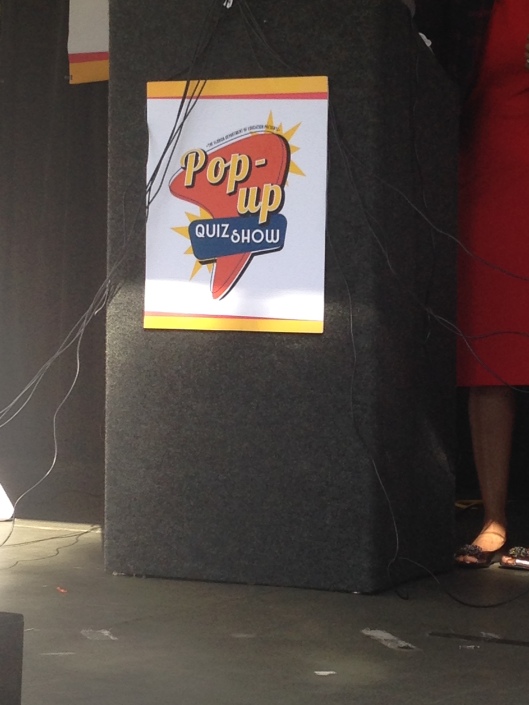
Here, Hope Colle welcomes students to the show and reminds them of the importance of reading and of civics. Great point; you can’t be a completely engaged citizen without reading OR civics!
The wonderful principal of the school, Ms. Kendrick, instructed the students on what to expect and how to behave during the show.
One of the great civics teachers at the school, Mr. Winters, volunteered to be the emcee and read the questions to the students.
The show consisted of two rounds, with two teams of four students each in each round. Here, we see Team Plead the Fifth and Team Phoenix as they get ready.
The kids really did do a fantastic job with the quiz show. It was refreshing to see some strong level of knowledge relating to what were not necessarily easy questions. And thanks are due to the Florida Joint Center for Citizenship’s own Dr. Terri Fine for crafting the questions for the show! Check out these kids dropping some knowledge bombs, for example:
In the next round, Team Civicians and Team Roboboxers (hey, they are middle school kids!) clashed in an epic battle that came down to the final question!
So how did they select the players for the show? According to Mr. Winter, they actually held their own civics quiz bowl last week, and the top scorers across each class were asked to participate in the show. And the work and effort that these kids and their teachers put in to this is obvious. Kudos to everyone involved. I hope that we here at the FJCC can continue to assist our friends across the state in this sort of thing, and it is wonderful to see that great passion for civics reflected in the work of the schools, teachers, and students! If you have questions or comments, or want to know when the pop up quiz show might be coming near you, contact Hope Colle or Ashley Palelis. You can also just send me a note!


